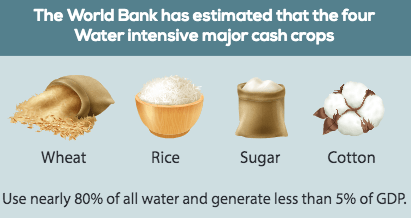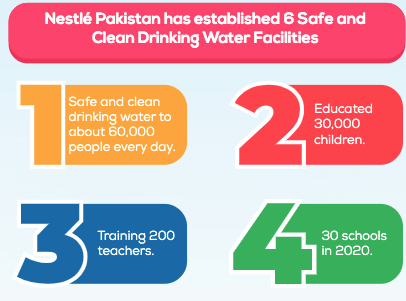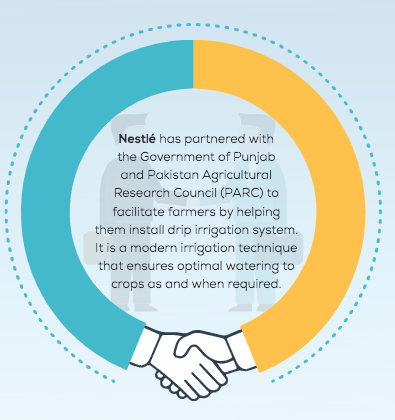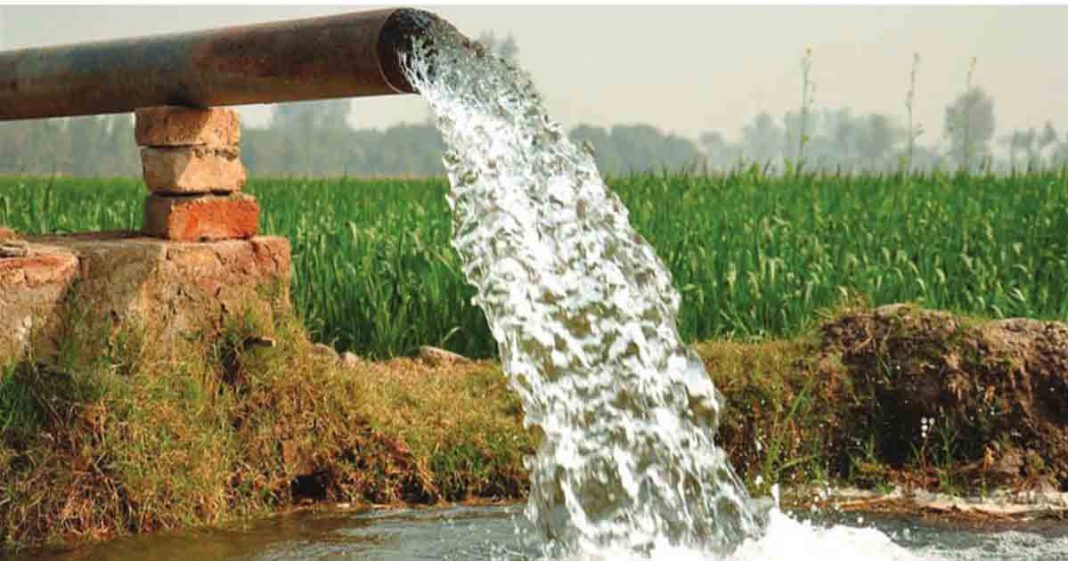Water is a key resource for the livelihood of people and sustainable development for any economy. The theme for World Water Day 2021 revolves around ‘Valuing Water’, focusing on the environmental, social, and cultural value people place on the water.
By virtue of expressing the importance of water differently for everyone, we will explore what it means for an economy like Pakistan, which is mostly rural. Water takes on more significance for agrarian economies.

The water supply in Pakistan depends on a single source, the Indus basin, to meet most of its water demands. This is why water availability and its efficient utilization lies at the heart of any strategy to ensure sustainable food security and long-term economic growth.
Read More: Alarming Water Situation for Pakistan & No Light at End of the Tunnel
The current water availability in Pakistan is not only limited but also mismanaged and quite unpredictable. On top of it, the overall availability faces significant risks from increasing pollution and climate change conditions.
On the other hand, the demand for water is rising increasingly and is inelastic at the same time, on account of a rapidly growing population. Thus, the resulting imbalance poses water challenges across different sectors throughout the country.
Water wastage in agriculture sector
The recent Pakistan Economic Survey 2019-2020, which highlights the economy’s progress over the past year, mentions that the agriculture sector recorded a growth of 2.67% in 2020 while contributing about 19% to the overall GDP (despite the global pandemic).
There is a flip side, however. The more this sector grows, the more water is used to produce the four water-intensive cash crops in the country, including, rice and sugar. For instance, to produce a kilogram of sugarcane, 1,500 3,000 liters of water is required.
Read More: Water Wars – A battle for Pakistan
Similarly, rice water productivity in Pakistan is 55 percent lower than the average water productivity in Asian countries. The World Bank has also estimated that the four major crops, i.e., wheat, rice, cotton, and sugar cane that use nearly 80 percent of all water generate less than 5 percent of the GDP, around $14 billion per year.
While talking to GVS, Hammad Naqi Khan, Director General, WWF-Pakistan, said: “Agriculture sector is the largest user of water resources in Pakistan. There is a dire need to build farmers’ capacity and capability to adopt efficient irrigation technologies and agronomic practices. Increased investments in innovation in the water sector should be encouraged especially in initiatives that promote agriculture water stewardship for improved water use efficiency and agricultural productivity.”
Read More: Water is the New Gold: An Emerging Source of Global Conflicts
Role of the private sector
The private sector can play a significant role in this regard. It has the resources and ability to create meaningful partnerships to ensure sustainable water consumption onsite and offsite.
Read More: Will ‘Safe Water’ lead Pakistan’s Fight against COVID-19?
The private sector has a vital role in addressing the growing threat of water scarcity in developing economies such as Pakistan, not only in terms of water use efficiency but also in wastewater management.
Case of Nestlé Pakistan
The Caring for Water-Pakistan (C4W) initiative introduced by Nestlé Pakistan in 2017 is a case worth mentioning. It is an example of how the private sector can conserve this precious shared resource.
Nestlé’s C4W-Pakistan initiative has three pillars, i.e., Factories, Communities, and Agriculture. Under the Factories component, the company is undertaking many projects to ensure in-house efficiencies, i.e., reduce, reuse, and recycle water, and implement the Alliance for Water Stewardship (AWS) Standard across all its four sites in Sheikhupura, Islamabad, Kabirwala, and Port Qasim.
Read More: Climate Change and Mismanagement of water resources in Agriculture sector
AWS is an international standard for freshwater resources that guides organizations to manage water by taking site and catchment initiatives through stakeholder inclusive processes.

Furthermore, the company has undertaken the WASH (Water, Sanitation and Hygiene) Pledge (as part of which companies commit to implementing access to safe water, sanitation, and hygiene at the workplace at an appropriate level), covering more than 4000 employees across the country.
Similarly, Nestlé Pakistan has established 6 Safe and Clean Drinking Water Facilities across all its operational sites providing access to safe and clean drinking water to about 60,000 people every day. The company also creates awareness about the responsible use of water among school children.
Read More: Politicisation of water resources in South Asia: Impending omens of war -I
It has educated 30,000 children by training 200 teachers in 30 schools in 2020. Adding on is the third pillar most relevant to our discussion here, i.e., Agricultural Supply Chain. The work that Nestlé Pakistan is doing in this area not only requires appreciation but also requires a countrywide scale-up.
Nestlé has partnered with the Government of Punjab and Pakistan Agricultural Research Council (PARC) to facilitate farmers by helping them install a drip irrigation system. It is a modern irrigation technique that ensures optimal watering to crops as and when required.
“As part of its C4W Pakistan initiative, Nestlé has saved an estimated 450 million liters of water by helping install drip irrigation set up on 152 acres in Punjab and Islamabad. We have developed lighthouses across various parts of Punjab to create awareness by doing and not just preaching, attracting more farmers to adopt innovation in farming,” said Waqar Ahmad, Head of Corporate Affairs and Sustainability, Nestlé Pakistan.
Read More: Politicisation of water resources in South Asia: Impending omens of war – II
Nestlé has also partnered with Lahore University of Management Sciences (LUMS) and developed smart soil moisture sensors that read the moisture/water level of the soil and send regular data updates to a cloud from where the farmer receives information about which areas to irrigate and how much.

Moreover, the software has been developed with the help of Waupun (an organization based in Italy) that enables the farmers and the researchers to see the soil moisture level remotely on their computer screen.
This helps save water and increase productivity by reducing the chance of under or over-irrigation. Initially piloted at three pilot farms, these sensors have been scaled up to 25 locations (different private farms, institutions, and government organizations) as of 2020.
Read More: Climate change and worsening water situation in Pakistan
Way Forward
It is evident that the corporate sector, which is already involved in implementing water stewardship, can play an integral role in enhancing other businesses or sectors’ capacity. This is especially true for the agriculture sector in Pakistan, which is still based on conventional practices and rudimentary concepts of irrigation.
Also, since water is a shared resource, it requires shared responsibility for its management and usage. No single entity or organization can create an impact in isolation, so collective action or collaboration is key to sustainable water resources.
Read More: The water quest: In search of a solution to alarming scarcity
Moreover, because of the slow innovation taking place in the agriculture sector, private sector entities/businesses can help uplift this sector through initiatives such as C4W-Pakistan to reduce the water wastage in agriculture and eventually slow down the looming water scarcity that Pakistan faces.














